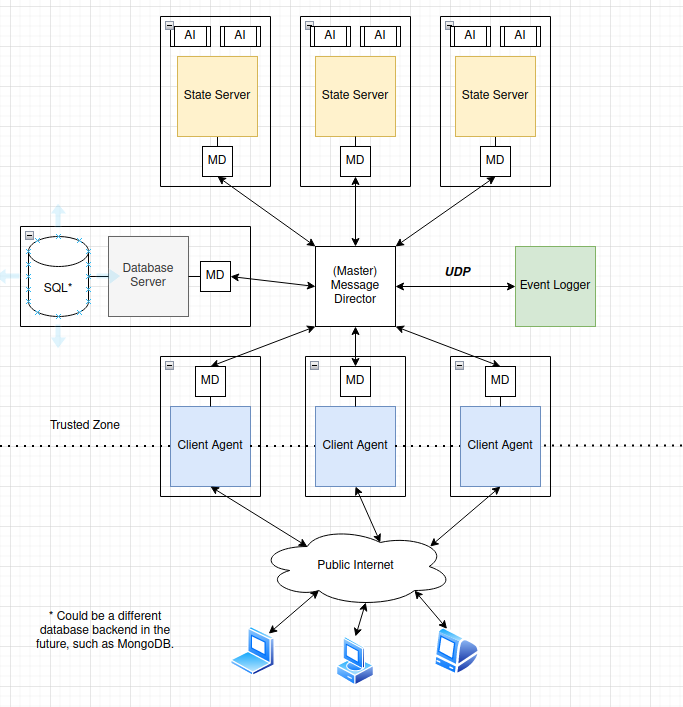Daemon Services
The architecture of a Donet server cluster is made up of 6 unique services:
The Client Agent
The Client Agent service manages connections with anonymous clients that are connecting from outside of the internal server network. Clients do not directly communicate with the Donet cluster. Instead, the Client Agent relays client messages over to the network. This component provides two of the main features in a Donet server cluster, which is security and network culling. It reads the DC file(s) given to it and approves all messages from clients that conform to the communication ‘contract’ defined in the DC file. It also checks for other details, such as the clients’ ownership over Distributed Objects and the visibility (or location) of Distributed Objects. The Client Agent acts as the border between the untrusted clients and the internal server network’s ‘safe zone’ [1].
For more details on this service’s behavior, see Client Agent.
The Message Director
The Message Director listens for messages from other services in a Donet server cluster, and routes them to other services based on the recipients in the message headers. A message is a blob of binary data sent over the network, with a maximum size of approximately 64 kilobytes. The routing is performed by means of routing identifiers called channels, where a message contains any number of destination channels, and most messages include a source, or sender channel. Each service tells the Message Director which channels it would like to subscribe to, and receives messages sent to its subscribed channels.
For more details on this service’s behavior, see Message Director.
The State Server
The State Server service is responsible of coordinating the short-term existence of Distributed Objects and their states. This component provides one of the main features in a Donet server cluster, which is short-term persistence. All Distributed Objects in a State Server exist in memory and are part of a graph hierarchy called the visibility tree. The State Server has data stored for each Distributed Object such as the class of the object, what its Distributed Object ID (DoId) is, and where it is located in the visibility tree. Other services in a Donet cluster may communicate with the State Server through a Message Director to manipulate and query Distributed Objects in the State Server’s visibility tree.
For more details on this service’s behavior, see State Server.
The Database Server
The Database Server service is responsible for the long-term persistence of Distributed Object fields that are marked in the DC file with a “db” keyword, which tells the Database Server to store them on disk. It stores these fields in a SQL database, and can update or query the Distributed Object’s field’s value. The game/application developer does not need to handle Database transactions with the help of this service. The successor of this component is the Database State Server.
For more details on this service’s behavior, see Database Server.
The Database State Server
The Database State Server (DBSS for short) is a kind of hybrid service of a State Server and a Database Server. This component is allows for other services in the cluster to manipulate Distributed Object fields that are currently not loaded on a State Server. The DBSS can also be configured to listen to a range of DoId’s which it manages. If it sees a location update for an object in its range, it will query the object from the database and convert it into a State Server object in memory. For example, this is useful if you have an avatar object that is currently offline and stored on the database. If you would like to award a prize to the avatar while they’re offline, the DBSS allows you to query and manipulate the object even though it is not currently needed in memory as the avatar is not actively ‘present’ in the State Server’s visibility tree.
For more details on this service’s behavior, see Database State Server (DBSS).
The Event Logger
The Event Logger listens to the Message Director for log messages that it should write to the disk. These log messages can be sent from AI processes, which are sent to a Message Director instance, which then routes it to the Event Logger. The Event Logger is a useful tool for providing instrumentation to your server cluster and allows the developer to analyze data in the game, depending on what the developer chooses to log. The Event Logger is the only service that uses the UDP protocol and serialization with MessagePack.
For more details on this service’s behavior, see Event Logger.
Cluster Example
The following diagram shows an example of a Donet cluster:

Donet can be configured to serve as all these services under one daemon [2],
which is handy for development on your local machine. For a production
environment, many instances of Donet can be running on different machines and
configured to serve as one service each. This configuration would be in a
.toml file that the Donet daemon would read on startup. The program will
look for a daemon.toml file by default, but you can specify a different file
name via argument. (See donetd --help for more information.)
